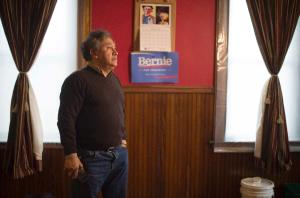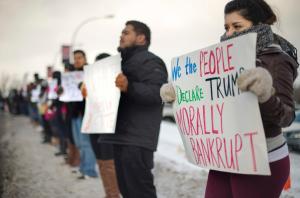In the small town of West Liberty, Iowa, more than half of the population of 3,700 are Hispanic, making it a small Latino speck in this largely white state that kicks off the U.S. presidential nominations process next week.
Mexicans have come to West Liberty for a century to work in poultry plants. Turkeys awaiting their turn can be seen in outdoor trailers near the tiny downtown.
Members of the local Latino community, even those who are citizens, hardly turn out on US election day.
“Politics comes after the economy for me,” said Dolores Rios, a permanent US resident from Mexico, amid mounds of dough in the back room of a bakery in West Liberty, Iowa.
Rios said she likes Democratic frontrunner Hillary Clinton.
“Never Donald Trump,” she said of the top Republican candidate, pointing to his “way of thinking.”
But she admitted she does not know much about politics. And with enough trouble making ends meet, she said she has no time to devote to it.
Year after year, political analysts herald the rise of the Hispanic vote. But the giant is lying low — despite intense efforts by Democrats, and to a lesser extent Republicans, to mobilize it.
Hispanics represent an electoral group seeing the fastest growth, in comparison to whites and African Americans. But abstention is much higher among them. Half did not cast ballots in 2012, compared to about a third of blacks and whites, according to the Pew Research Center.
Concentrated in certain states such as Florida and Nevada, they are more or less ignored in a state like Iowa, which holds closely watched caucuses on Monday.
“We come from countries where democracy is just a name,” said 60-year-old Jose Zacarias.
Since his arrival in the United States in 1984 as an illegal immigrant, he has done all sorts of jobs and became a naturalized citizen through marriage.
Unlike Rios, Zacarias decided to get involved politically as a city council member and is now campaigning for Clinton rival Bernie Sanders.
“People come into the north, to the US, more than anything for economic reasons,” Zacarias said.
“The Latinos want immediate rewards. They want to see money. They came here to work.”
Latino community leaders are mobilizing to fight voter apathy.
This week, Trump — who has angered Latinos in America by saying Mexico sends “rapists” across the border into the US and vowing to build a frontier wall — held an event at a school in Marshalltown, Iowa, where many students have Mexican roots.
Among them was 14-year-old Baltazar, who came with an expletive-filled message for the billionaire real estate mogul, to the effect that he should go back home.
Outside the venue, several youths protested in silence, holding up posters that, among other things, said: “A vote for Trump is a vote for hate.”
But the daytime demonstration didn’t take off.
Nearby, the country’s oldest Hispanic civil rights organization, the League of United Latin American Citizens, is organizing workshops to inform community members about Monday’s caucuses.
The group is staying neutral officially, but Latinos largely vote Democrat, with 71 percent of those casting ballots in 2012’s presidential election doing so.
LULAC’s Christian Ucles said he wants to encourage Hispanics to participate in all types of elections, be it the “race for the president or the school board.”
His organization will be among others joining volunteers for the presidential candidates in going door-to-door over the weekend ahead of the caucuses.
Paradoxically, Trump’s anti-immigrant proposals and the hardening stance of other Republican candidates on the subject could galvanize the Republican base instead of mobilizing Hispanics.
“Rather than a moment of triumph, this could be the year of the Latino eclipse,” Roberto Suro, professor of public policy and journalism at the University of Southern California, wrote in The New York Times, deploring the relative political passivity of Hispanics and lack of big protests against Trump.
Trump, meanwhile, is drawing droves to his events, building his support consisting of Republicans, disappointed Democrats and voters who once shunned the ballot box.
Source: http://news.yahoo.com/





